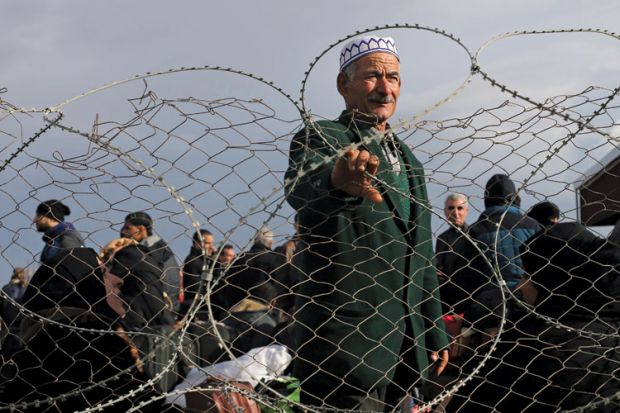Just like landlords and employers, universities are increasingly expected to act as unofficial border guards.
“Each of us is becoming a border guard,” says Nira Yuval-Davis, director of the Centre for Research on Migration, Refugees and Belonging at the University of East London, “though we have not been trained, because we are asked to check the passports of everybody we [deal with] as employers, as educators, as service providers.” Travellers getting off the Eurostar at St Pancras are often waved through with the most cursory check, but universities (among many others) need to be far more thorough and can face a hefty fine if they fail to spot someone with a fake passport.
Increased security checks, in Yuval-Davis’ view, also have wider political consequences, with larger and larger groups “suspected as illegal or illegitimate” and people “afraid to rent their houses” or employ relatives in family restaurants.
So borders have, as it were, been brought to the gates of universities as a practical question that they can no longer afford to ignore. Yet borders are also central to many of the crucial issues of our time – the vicious chaos of the Middle East, the refugee crisis, the terrorism threat – on which academics have important expertise to offer. Over the past decade, the discipline of border studies has risen to these challenges.
“There has been a gradual shift from the notion of borders as lines to bordering as a dynamic process,” claims Yuval-Davis. Colonial powers could draw lines on a map “without any regard to the experiences and needs and feelings of the local people”. These remain extraordinarily potent: “Even now the war in Syria and Iraq is very explicitly aimed at demolishing the [Anglo-French] Sykes-Picot Agreement after the First World War, which created the borders in the Middle East.”
Yet today we also need to take account of many other kinds of border and to “look at bordering from the point of view of the situated gaze of different social agents”, she added, since tourists and undocumented migrants, for example, tend to have very different perspectives.
Yuval-Davis was speaking to Times Higher Education last month at the time of a major conference she had organised at UEL titled “EUborderscapes”.
“Border studies have undergone a major renaissance during the past two decades,” agrees David Newman, dean of the Faculty of Humanities at Ben-Gurion University, another leading figure in the field who led a conference talk about “growing up on the 73 bus – urban and ethnic change along the Hackney/Islington border”.
This “renaissance” in border studies, Newman went on, was “evidenced in a large number of conferences, publications, organisations and major research funding”. But it was also shown in how the discipline had reinvented itself in response to changing times. While writers in the 1980s and 1990s “dealt with the impact of globalisation, the fall of the Iron Curtain and the expansion of the European Union on the opening and ultimate removal of borders”, scholars since 9/11 “have reintroduced a strong securitisation dimension which focuses on the resealing and closing of borders”.
Other important new themes included: the local “metropolitan, municipal and planning borders which impact daily life, even though their physical crossing is not a problem”; “the significance of trans-boundary regions”; and “the images and presentations of borders in maps, film, literature, art and graffiti”. All these themes were up for debate at the UEL conference, which was built around a major EU-funded research project involving 22 partner institutions from 17 different states.
About four and a half years ago, explained James Scott, professor of regional and border studies at the Karelian Institute at the University of Eastern Finland, “the EU decided to look into ‘the evolving concept of borders’”. He went on to give several examples of how “borders are taking central stage in what we read every day”. We were seeing “refugees trying to get into ‘core Europe’ who had ended up [at the time] marooned in Hungary”. The ongoing crisis in Ukraine was presenting “a challenge to the EU and its neighbourhood policy”, he added.
Separate panels at UEL explored themes such as “post-Soviet borders”, “Europeanisation versus Euroscepticism”, “Roma and bordering” and “everyday bordering in the metropolitan city”. Christophe Sohn, head of the department of urban development and mobility at the Luxembourg Institute of Socio-Economic Research, presented his findings on “greater Geneva”. This could be seen as an example of “strong cross-border functional integration”, with large numbers of French workers commuting into the city each day for the much higher wages available there. Yet there are also notable countervailing pressures for “rebordering”, which are “fed by the police, racist and xenophobic discourses” as well as by “workers from southern Europe trying to freeze out the cross-border workers from France”.
The UEL conference, billed as a policy-oriented event, also heard from those campaigning for the rights of migrants and refugees. Maria Giovanna Manieri, programme officer (borders, detention and legal strategies) from the Platform for International Cooperation on Undocumented Migrants, cited reports that “more than 700,000 migrants arrived at the external borders of the EU during the first nine months of 2015, leading to continuous tragedies both at sea and land borders” and that “over 30,000 refugees and migrants have died since 2000 attempting to reach or stay in Europe”.
In 2012, she added, “a young undocumented bakery worker” in Greece was “chained up and tortured for 18 hours in a stable by his employer” after claiming his wages, and then immediately arrested when he was taken to hospital. Along with a need for “evidence-based reform”, Manieri called for legal firewalls so that migrants can report crimes without the risk of deportation.
In her own presentation, Yuval-Davis was equally clear about the policy implications of her work, stating that current British policy on border control “undermines the whole ideal of a convivial multicultural society which has been relatively successful here”. None of us can avoid thinking about borders, and border studies now claim to offer essential analytical tools and an evidence base for this thought.
POSTSCRIPT:
Print headline: Border studies get to heart of crisis
Register to continue
Why register?
- Registration is free and only takes a moment
- Once registered, you can read 3 articles a month
- Sign up for our newsletter
Subscribe
Or subscribe for unlimited access to:
- Unlimited access to news, views, insights & reviews
- Digital editions
- Digital access to THE’s university and college rankings analysis
Already registered or a current subscriber?




